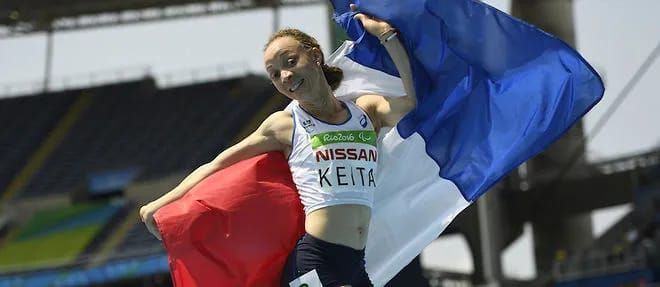
A spearhead of French para-athletics, Nantenin Keïta, gold medalist in the 400m at Rio 2016, trains tirelessly. Her goal: another medal in Paris. Nantenin Keita cultivates a strength of character that she dedicates to her sport and her advocacy for albino children.
When one mentions Nantenin Keïta, the first thing that comes to mind is an image of determination, resilience and sporting excellence. This French Paralympic athlete, specializing in sprinting, perfectly embodies the spirit of competition and the relentless pursuit of perfection.
But Keita also carries her father's name, Salif, a renowned Malian musician. From him, she inherited albinism, a genetic trait that gave her fair skin and impaired vision. Born in Bamako in 1984, she moved to France at the age of two: “My father, having grown up in Mali, did not want me to face the same difficulties he did, whether in society or in education. With visual impairment, you don't learn the same way.”
As a teenager, she initially tried handball, “but because of my vision, I caught the ball too late,” then basketball, before discovering athletics through a competition for visually impaired athletes. On the track, she runs without a guide, relying on contrasts of colors rather than her sight: “Tracks are often blue, red, with lines marked in white. I don't need to know exactly where I am, like at 190 meters, for example. I need to know I'm coming out of the turn, I'm on the final straight.”
'No Superpowers'
She has experienced contrast and comparison in her daily life, through her skin color and her disability. “When I went to school, no one had the same skin color, so it didn't surprise me to have a different one. I had my own white. So I asked why I was treated differently, looked at differently. Same for vision! I thought everyone saw like me and sometimes walked into walls!”
“Well supported,” with her father as a role model, Nantenin now helps albino children, which she sees as a natural calling.
The Beginnings of a Distinguished Career
Nantenin began attracting international attention at the Paralympic Athletics World Championships, demonstrating raw talent and unwavering determination. In 2008, in Beijing, she won silver in the 200 meters in the T13 category, marking the beginning of her rapid rise.
But it was at the Rio Paralympic Games in 2016 that Nantenin truly made her mark. With a stunning performance, she clinched gold in the T13 400 meters, solidifying her status as a sprinting elite in Paralympic sports. This victory was not just an athletic feat, but also a powerful message of self-transcendence and resilience.
Nantenin Keïta's Legacy
As Nantenin prepares for a new series of competitions, her impact extends far beyond medals and records. She embodies a model of resilience and courage, inspiring millions worldwide to pursue their dreams despite obstacles. Her journey proves that limits are often mere illusions, and true strength lies in perseverance and self-belief.
An icon of the Paralympic spirit, her pursuit of excellence and advocacy for albino rights make her an essential figure in sports and an inspiring example for future generations.

Ultimate Goal
Approaching the 2024 Paris Paralympic Games, Nantenin is more determined than ever. Her rigorous training and unwavering discipline attest to her desire to defend her title and continue pushing boundaries. Her coach, Jean-Philippe Durand, describes her as an athlete “whose rigor and passion are exemplary,” adding that she is “ready to give her best on the track.”
Nantenin Keïta will captain Team France in Paris, marking the ultimate goal of her sporting career. “This time, it's truly my last major event; the Paris Paralympic Games will be my final competition. After that, I'm done, I promise!” jokes Nantenin Keïta, who had previously announced her retirement after the 2012 London Games and then after the 2021 Tokyo Games. “I wouldn't have extended if the Games weren't held at home,” adds the Franco-Malian champion.
“My biggest dream would be to leave the Paris Games without regrets, and to win a medal in packed stadiums.”
Everyone is invited.
When one mentions Nantenin Keïta, the first thing that comes to mind is an image of determination, resilience and sporting excellence. This French Paralympic athlete, specializing in sprinting, perfectly embodies the spirit of competition and the relentless pursuit of perfection.
But Keita also carries her father's name, Salif, a renowned Malian musician. From him, she inherited albinism, a genetic trait that gave her fair skin and impaired vision. Born in Bamako in 1984, she moved to France at the age of two: “My father, having grown up in Mali, did not want me to face the same difficulties he did, whether in society or in education. With visual impairment, you don't learn the same way.”
As a teenager, she initially tried handball, “but because of my vision, I caught the ball too late,” then basketball, before discovering athletics through a competition for visually impaired athletes. On the track, she runs without a guide, relying on contrasts of colors rather than her sight: “Tracks are often blue, red, with lines marked in white. I don't need to know exactly where I am, like at 190 meters, for example. I need to know I'm coming out of the turn, I'm on the final straight.”
'No Superpowers'
She has experienced contrast and comparison in her daily life, through her skin color and her disability. “When I went to school, no one had the same skin color, so it didn't surprise me to have a different one. I had my own white. So I asked why I was treated differently, looked at differently. Same for vision! I thought everyone saw like me and sometimes walked into walls!”
“Well supported,” with her father as a role model, Nantenin now helps albino children, which she sees as a natural calling.
The Beginnings of a Distinguished Career
Nantenin began attracting international attention at the Paralympic Athletics World Championships, demonstrating raw talent and unwavering determination. In 2008, in Beijing, she won silver in the 200 meters in the T13 category, marking the beginning of her rapid rise.
But it was at the Rio Paralympic Games in 2016 that Nantenin truly made her mark. With a stunning performance, she clinched gold in the T13 400 meters, solidifying her status as a sprinting elite in Paralympic sports. This victory was not just an athletic feat, but also a powerful message of self-transcendence and resilience.
Nantenin Keïta's Legacy
As Nantenin prepares for a new series of competitions, her impact extends far beyond medals and records. She embodies a model of resilience and courage, inspiring millions worldwide to pursue their dreams despite obstacles. Her journey proves that limits are often mere illusions, and true strength lies in perseverance and self-belief.
An icon of the Paralympic spirit, her pursuit of excellence and advocacy for albino rights make her an essential figure in sports and an inspiring example for future generations.

Ultimate Goal
Approaching the 2024 Paris Paralympic Games, Nantenin is more determined than ever. Her rigorous training and unwavering discipline attest to her desire to defend her title and continue pushing boundaries. Her coach, Jean-Philippe Durand, describes her as an athlete “whose rigor and passion are exemplary,” adding that she is “ready to give her best on the track.”
Nantenin Keïta will captain Team France in Paris, marking the ultimate goal of her sporting career. “This time, it's truly my last major event; the Paris Paralympic Games will be my final competition. After that, I'm done, I promise!” jokes Nantenin Keïta, who had previously announced her retirement after the 2012 London Games and then after the 2021 Tokyo Games. “I wouldn't have extended if the Games weren't held at home,” adds the Franco-Malian champion.
“My biggest dream would be to leave the Paris Games without regrets, and to win a medal in packed stadiums.”
Everyone is invited.
Read more




Comments